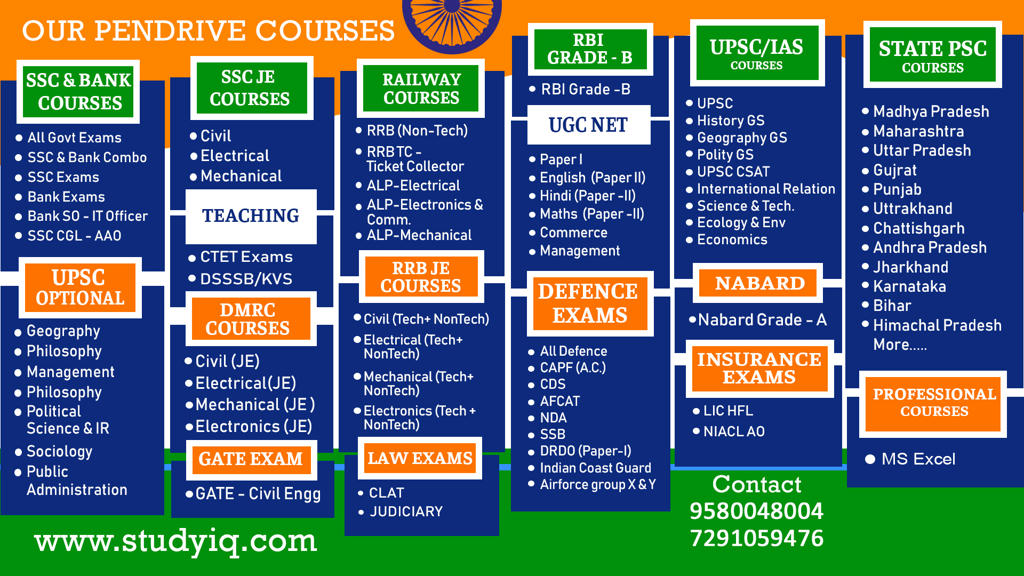Table of Contents
MCQ 1
- Present repo rate is 5.40% decided by finance ministry
- It will lower the liquidity in the economic system of country
Choose correct
(A) Only 1
(B) Only 2
(C) Both
(D) None
MCQ 2
- National Electronic Funds Transfer (NEFT) is an electronic funds transfer system maintained by the NPCI
- fund transfers through the NEFT system occur in real-time basis.
Choose correct
(A) Only 1
(B) Only 2
(C) Both
(D) None
- National Electronic Funds Transfer (NEFT) is an electronic funds transfer system maintained by the Reserve Bank of India (RBI). Started in November 2005, the setup was established and maintained by Institute for Development and Research in Banking Technology(IDRBT).
- NEFT enables bank customers in India to transfer funds between any two NEFT-enabled bank accounts on a one-to-one basis. It is done via electronic messages. Unlike real-time gross settlement (RTGS), fund transfers through the NEFT system do not occur in real-time basis. NEFT settles fund transfers in half-hourly batches with 23 settlements occurring between 24×7 of the calendar month. Transfers initiated outside this time period are settled at the next available window. No settlements are made on the second and fourth Saturday of the month, or on Sundays, or on public holidays.
Transfer funds 24×7 via NEFT from Dec.
- Come December, you can transfer funds round-the-clock using the National Electronic Funds Transfer or NEFT facility. RBI Governor Shaktikanta Das announced on Wednesday that the central bank would make available the NEFT system 24×7 from December.
- Currently the system is available from 8 a.m. to 7 p.m. on all working days except second and fourth Saturdays of the month.
- In another citizen-friendly measure, the Reserve Bank has thrown open the Bharat Bill Payment System to all categories of billers, except prepaid recharges.
MCQ 3
- Consumer Protection Bill, 2019 Proposes to set up a Central Consumer Protection Authority
- CCPA will be the main Consumer Disputes Redressal body
Choose correct
(A) Only 1
(B) Only 2
(C) Both
(D) None
MCQ 4
PART XX of the constitution is related to
- J&K & 370
- Temporary, transitional and special provisions
- Official language
- Amendment of the constitution
MCQ 5
Article 371 explains
- J&K’s special status in 370
- North east states special provision
- Procedure to amend 370
- None
Article 371, Maharashtra and Gujarat:
Governor has “special responsibility” to establish “separate development boards” for “Vidarbha, Marathwada, and the rest of Maharashtra”, and Saurashtra and Kutch in Gujarat; ensure “equitable allocation of funds for developmental expenditure over the said areas”, and “equitable arrangement providing adequate facilities for technical education and vocational training, and adequate opportunities for employment” under the state government.
What is Article 371?
- Articles 370 and 371 were part of the Constitution at the time of its commencement on January 26, 1950; Articles 371A through 371J were incorporated subsequently.
- Home Minister Amit Shah told Lok Sabha Tuesday that the government had no intention of removing Article 371 of the Constitution, which includes “special provisions” for 11 states, including six states of the Northeast. His assurance came after Congress leaders expressed apprehension that having rendered Article 370 irrelevant, the government might unilaterally move to abrogate or modify Article 371.
- Articles 369 through 392 (including some that have been removed) appear in Part XXI of the Constitution, titled ‘Temporary, Transitional and Special Provisions’. Article 370 deals with ‘Temporary Provisions with respect to the State of Jammu and Kashmir’; Articles 371, 371A, 371B, 371C, 371D, 371E, 371F, 371G, 371H, and 371J define special provisions with regard to another state (or states).
Article 371I deals with Goa, but it does not include any provision that can be deemed ‘special’.
- Article 371, Maharashtra and Gujarat: Governor has “special responsibility” to establish “separate development boards” for “Vidarbha, Marathwada, and the rest of Maharashtra”, and Saurashtra and Kutch in Gujarat; ensure “equitable allocation of funds for developmental expenditure over the said areas”, and “equitable arrangement providing adequate facilities for technical education and vocational training, and adequate opportunities for employment” under the state government.
- Article 371A (13th Amendment Act, 1962), Nagaland: This provision was inserted after a 16-point agreement between the Centre and the Naga People’s Convention in 1960, which led to the creation of Nagaland in 1963. Parliament cannot legislate in matters of Naga religion or social practices, Naga customary law and procedure, administration of civil and criminal justice involving decisions according to Naga customary law, and ownership and transfer of land without concurrence of the state Assembly.
- Article 371B (22nd Amendment Act, 1969), Assam: The President may provide for the constitution and functions of a committee of the Assembly consisting of members elected from the state’s tribal areas.
- Article 371C (27th Amendment Act, 1971), Manipur: The President may provide for the constitution of a committee of elected members from the Hill areas in the Assembly, and entrust “special responsibility” to the Governor to ensure its proper functioning.
- Article 371D (32nd Amendment Act, 1973; substituted by The Andhra Pradesh Reorganisation Act, 2014), Andhra Pradesh and Telangana: President must ensure “equitable opportunities and facilities” in “public employment and education to people from different parts of the state”. He may require the state government to organize “any class or classes of posts in a civil service of, or any class or classes of civil posts under, the State into different local cadres for different parts of the State”. He has similar powers vis-à-vis admissions in educational institutions.
- Article 371E: Allows for the establishment of a university in Andhra Pradesh by a law of Parliament. But this is not a “special provision” in the sense of the others in this part.
- Article 371F (36th Amendment Act, 1975), Sikkim: The members of the Legislative Assembly of Sikkim shall elect the representative of Sikkim in the House of the People. To protect the rights and interests of various sections of the population of Sikkim, Parliament may provide for the number of seats in the Assembly, which may be filled only by candidates from those sections.
- Article 371G (53rd Amendment Act, 1986), Mizoram: Parliament cannot make laws on “religious or social practices of the Mizos, Mizo customary law and procedure, administration of civil and criminal justice involving decisions according to Mizo customary law, ownership and transfer of land… unless the Assembly… so decides”.
- Article 371H (55th Amendment Act, 1986), Arunachal Pradesh: The Governor has a special responsibility with regard to law and order, and “he shall, after consulting the Council of Ministers, exercise his individual judgment as to the action to be taken”.
- Article 371J (98th Amendment Act, 2012), Karnataka: There is a provision for a separate development board for the Hyderabad-Karnataka region. There shall be “equitable allocation of funds for developmental expenditure over the said region”, and “equitable opportunities and facilities” for people of this region in government jobs and education. A proportion of seats in educational institutions and state government jobs in Hyderabad-Karnataka can be reserved for individuals from that region.
MCQ 6
For a exporting country normally
- Weaker currency is problematic for exporters
- Weaker currency supports exporters
- Currency strength is not related to exports
- None
US officially labels China a ‘currency manipulator‘.
- The announcement by the US Treasury follows a sharp fall in the value of the Chinese yuan against the dollar.
Why is the US worried?
- A weaker yuan makes Chinese exports more competitive, or cheaper to buy with foreign currencies.
- Background: • China has a long history of facilitating an undervalued currency through protracted, large-scale intervention in the foreign exchange market.
- In recent days, China has taken concrete steps to devalue its currency, while maintaining substantial foreign exchange reserves despite active use of such tools in the past. What is currency manipulation and who determines it?
- The US Department of the Treasury publishes a semi-annual report in which the developments in global economic and exchange rate policies are reviewed.
- If a US trade partner meets three assessment criteria, the US labels it a currency manipulator.
- The US Treasury department defines currency manipulation as when countries deliberately influence the exchange rate between their currency and the US dollar to gain “unfair competitive advantage in international trade”. How are countries identified for the currency manipulation list? The US Treasury has established thresholds for the three criteria. 1. First, a significant bilateral trade surplus with the US is one that is at least $20 billion. 2. Second, a material current account surplus is one that is at least 3% of GDP. 3. Third, persistent, one-sided intervention reflected in repeated net purchases of foreign currency and total at least 2% of an economy’s GDP over a year.
Rationale behind:
- The Treasury’s goal is to focus attention on those nations whose bilateral trade is most significant to the US economy and whose policies are the most material for the global economy.
What next?
- When the US Treasury labels a country a currency manipulator – as it has done here with China – the next step would normally be for negotiations to begin between the two countries. In this case, trade negotiations have already been going on for more than a year.
- The process also opens the path for America to introduce tariffs. Again, that’s already happening as part of Mr Trump’s ‘America First‘ approach to trade.
- Under the 1988 Omnibus Foreign Trade and Competitiveness Act, the U.S. will have to negotiate with China or take its case to the International Monetary Fund. Potential penalties by the U.S. include:
- Banning the Overseas Private Investment Corporation — an American government agency that invests in developing countries — from financing China.
- Excluding China from U.S. government procurement contracts.
MCQ 7
- A depreciation occurs when a country makes a conscious decision to lower its exchange rate in a fixed or semi-fixed exchange rate.
- A devaluation is when there is a fall in the value of a currency in a floating exchange rate.
Choose correct statements
(A) Only 1
(B) Only 2
(C) Both
(D)None
MCQ 8
Gaza Strip borders
- Israel & Lebanon
- Israel & Jordan
- Israel & Egypt
- Totally in Israel
MCQ 9
Total No. of States which have coast in India
(A)6
(B)7
(C)8
(D)9






















 WhatsApp
WhatsApp